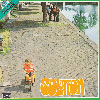SOLUTION : SOLUTION
- Koan
- Preview
- Phases
- Trane Steps
- Circus Circumstances
Bonus Tracks (Divergence): - Second Line
- Divergence
- Concentration
- Theme
- New Dimension
Label : EMI / Bovema
Release Year : 1972
Length : 73:10
Review for Solution (Wikipedia) : Solution is the first album by the Dutch symphonic rock group Solution. It was released in 1971 on the Decca label. It is the only Solution album to feature original vocalist and bassist Peter van der Sande, who was replaced by Guus Willemse around the time of the LP release. Van der Sande provides raw vocals on "Phases", while the other four tracks are instrumental. Solution was recorded over three consecutive days in May 1971. "Koan", "Trane Steps" and "Circus Circumstances" all feature frantic ensemble playing by the band, complemented by the relatively peaceful "Preview". The theme from the latter song would later be incorporated into the codas of "Second Line" and "Third Line" on the subsequent two albums. "Circus Circumstances" is based on a composition by French composer Jacques Ibert. In 1976 Solution was coupled with Divergence as a double album, retaining the eponymous title. This pairing was issued by EMI on Compact Disc in 1988 and again in 2007. In 2006, the entirety of the first album was included on The Ultimate Collection.
Review for Solution (ProgWereld) : Toen op 6 september 2012 Willem Ennes op 64-jarige leeftijd in Amsterdam overleed, werd er in de Nederlandse pers meer melding gemaakt van het feit dat hij de echtgenoot was van presentatrice Astrid Joosten, dan van zijn werk bij de Nederlandse formatie Solution. Hooguit stond er in de berichtgeving een voetnoot: hij speelde ooit toetsen bij een vaag jaren '70 jazzrock-bandje. Toen ik dit las realiseerde ik me des te meer in wat voor niche wij als progfans leven. Gelukkig is in 'ons wereldje' Solution een redelijk bekende naam, zeker in Nederland. Tussen 1971 en 1982 maakte de groep met relatief weinig bezettingswijzigingen zes platen, die zowel muzikaal als qua platenmaatschappij duidelijk onder te verdelen valt in drie periodes, waarin Solution behoorlijk van kleur verschoot. Dit in 1971 uitgekomen debuut valt, samen met de opvolger "Divergence" van een jaar later, uit de eerste 'Harvest'- of beter gezegd - EMI-periode. Deze eerste twee platen zijn - beide voor het eerst - geremasterd en wel door Esoteric Recordings op cd uitgebracht en dat is volkomen terecht. Beide platen zijn een aanwinst voor elke liefhebber van jazzy getinte symfonische rock boordevol Soft Machine, John Coltrane en Traffic-invloeden, gelardeerd met een vleugje 'Canterbury'. "Solution", in drie dagen opgenomen in Heemstede, telt in elk geval vier volwaardige tracks en één korte interlude, waarvan het druk binnenstormende Koan direct opvalt in al zijn directheid. Wanneer het thema eenmaal is neergelegd en uitgewerkt, krijgt Tom Barlage alle ruimte voor prachtig saxofoonspel en nog mooier fluitspel, waarna Willem Ennes de ruimte opeist voor een eveneens voorbeeldige orgelsolo. Daarna valt het nog geen minuut lange Preview op door het feit dat je nog verrassend veel kan doen in één minuut. Phases is behalve het meest symfonische nummer ook het meest gedateerde van het debuut. Het is de enige compositie met zang van bassist Peter van der Sande en zijn zang maakt van het nummer een typisch product van zijn tijd. Toch bevat het mooie passages of 'fasen'. De spanningsopbouw - het nummer begint feitelijk pas rond de vier minuten - is voorbeeldig. Het vroegere kant 2 brengt ons Trane Steps, dat zich gedraagt als het rustige broertje van Koan en opvalt door de zalige interactie tussen Ennes op toetsen en Berlage op saxofoon. Het nummer laat ook horen dat de drumkwaliteiten van de toen nog slechts 22-jarige Hans Waterman niet te onderschatten zijn. Ondanks het feit dat Circus Circumstances als een op hol geslagen circus begint, en daarmee probeert Supersister in 'Hollandse meligheid' af te troeven (waar is die Nederlandse volkseigenschap eigenlijk gebleven in 2012?), ontkom je toch niet aan de conclusie dat Solution zonder meer van alle symfonische rockgroepen uit de jaren '70 de meest serieuze band is. Als het verplichte grapje van Circus Circumstances na een minuut is geweken, blijkt ook deze track formidabel. Het is natuurlijk ronduit schandalig dat "Solution" van Solution pas anno 2012 op cd is verschenen, gezien het historische belang van de band en de redelijke verkoopcijfers in de jaren '70. De drie verschillende platenmaatschappijen hielpen natuurlijk niet, alsmede het feit dat in 2005 "The Ultimate Collection" uitkwam, waarop alle nummers - zij het vaak in een live-uitvoering - langskwamen. Toch behoort "Solution" beoordeeld te worden op zijn geheel. En als geheel is "Solution" een klassieker.
Review for Divergence (Wikipedia) : Divergence is the second album by the Dutch symphonic rock group Solution. It was released in 1972 on the EMI subsidiary Harvest Records. This album is among the most progressive by the group. It consists of three instrumental pieces ("Fever", "Theme" and the title track) next to three tracks with vocals, sung by Guus Willemse, who had joined the band in 1971. Beginning as a piano-led song, "Second Line" "diverges" into a lengthy instrumental section which reprises a theme first heard in "Preview", from the album Solution the previous year. Similarly, "Theme" is based on a motif from the introduction to "Concentration". Part of the track "Divergence" was used by Focus in their 1973 epic "Eruption", found on their 1971 album Focus II (Moving Waves). The section was titled "Tommy" after Solution saxophonist Tom Barlage.[1] Consequently, the original song is perhaps the most well-known Solution track, owing to the success Focus enjoyed in the early seventies (Focus II is also home to the hit single "Hocus Pocus"). Divergence was reissued in 1976 as a double set with the first album, simply titled Solution. The shortest song, "Fever", was left off the subsequent reissue on Compact Disc in 1988, but was included on The Ultimate Collection in 2006.
